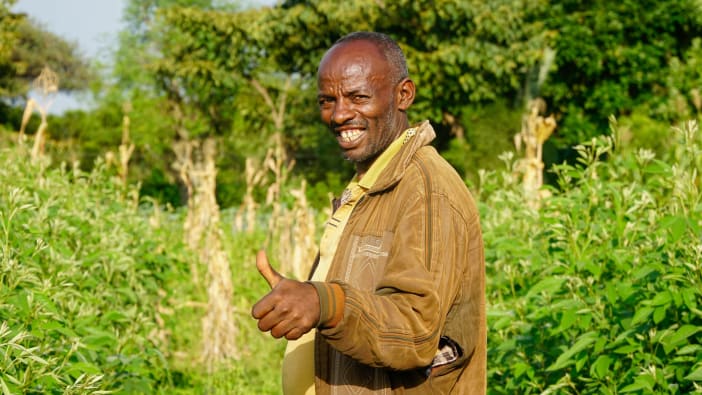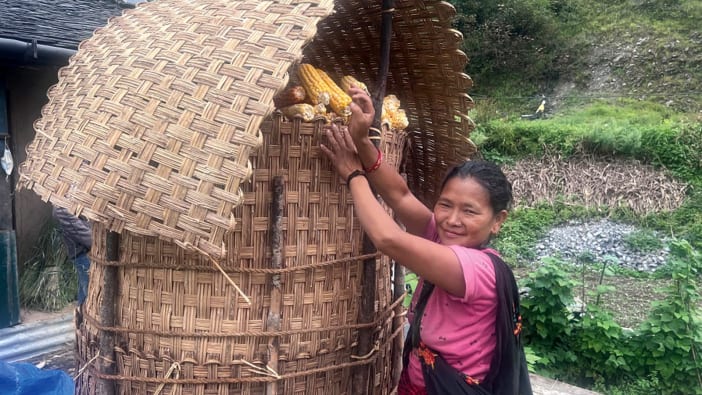by Dr Roger Sharland.
Sheep and goats are often neglected in development projects. But they are very important in the lives of those who do keep them. They act as a type of bank - animals can be sold for special occasions or for a particular need.
Their importance was recognised by the ACROSS project in Mundri District in Southern Sudan in the late 70s and early 80s. Investigation showed that although the sheep and goats survived under the local system of management, they were not very productive and there were many losses due to sickness.
One of the biggest problems was parasites. These were of two types:
- external parasites including lice, mites and ticks which pierce the skin and suck blood
- internal parasites, especially worms, which have the same effect from within the body.
These parasites weaken the animals, making them more likely to suffer from other diseases. They also reduce their growth rate and limit the fertility of the females.
A local programme was set up to reduce the very high number of parasites.
Treating external parasites
There are three main ways of treating the external parasites:
- Spray the animals with an appropriate chemical using a back-pack sprayer. Take care to spray the parts of the body where ticks hide. The person spraying must be very careful not to breathe in the chemical, or allow it to contact the skin.
- Spread grease over the animals to help reduce the parasite numbers. In Sudan the locally available shea butter was reasonably effective. Used engine oil is also effective but messy.
(The fish poison bean, Tehrosia vogelii, is reported to be effective in controlling ticks. Soak 1 litre of pounded fresh leaves in 1 litre of water for some while. Then brush the juice onto animals.) - Dip the animals in chemical dips. Because of their size, sheep and goats can be dipped in a 200 litre oil drum which has had the top removed. This is very effective but expensive and hazardous. Wear some form of waterproof clothing: for example, gloves and gum boots or plastic bags over the hands and feet and a long plastic apron.
Treating internal parasites
Drenching is necessary to treat the internal parasites. A solution is made up containing either commercial preparations or natural, locally available drugs. This is firmly poured down the throat of the animal using, ideally a large plastic syringe, or a soda bottle. Two good medicines are Nilzan and Valbazen which kill both worms and flukes. They are usually available in tablet form and must be ground up and diluted to the correct strength following instructions very carefully. Use a carefully marked bottle for measuring the right dose.
Lift the animal’s head and hold it firmly. Put the bottle or syringe into one side of the mouth and pour the medicine slowly on top of the tongue, giving the animal time to swallow. Make sure the animal has swallowed all the medicine before releasing its head.
Never use insecticides as drenches. Use only the correct chemicals.
In Sudan, ACROSS used the network of extension agents in the area to manage the programme. ACROSS trained local volunteers to carry out drenching and dipping, using supplies bought through the project. At first, treatments were given to sickly flocks so that the effects could be readily seen. Treated animals were stronger and better able to fight off disease. Growth and fertility were greatly increased.
These local volunteers, both men and women, who were reliable owners of sheep or goats, were the key to the success of the programme. They were the people who, for a small fee, actually carried out the treatments. The fee charged for treatment covered the cost of the medicines used, as well as giving a small payment for the work involved. These local volunteers were, in effect, ‘barefoot vets’. They met regularly for discussion and training on subjects such as improved pasture, breeding and other aspects of preventative veterinary health. The dipping and drenching were, however, the core of the programme. Because these were based on commercially produced supplies, the programme has now ceased due to the disruption caused by the civil war. It may be worth considering carefully the use of naturally occurring products before setting up a similar programme.
Can any readers help with information on naturally occurring chemicals?
Roger Sharland worked with ACROSS in Sudan as an agriculturalist. He is now a coordinator with RDE, OAIC, PO Box 21736, Nairobi, Kenya encouraging church rural development programmes.









